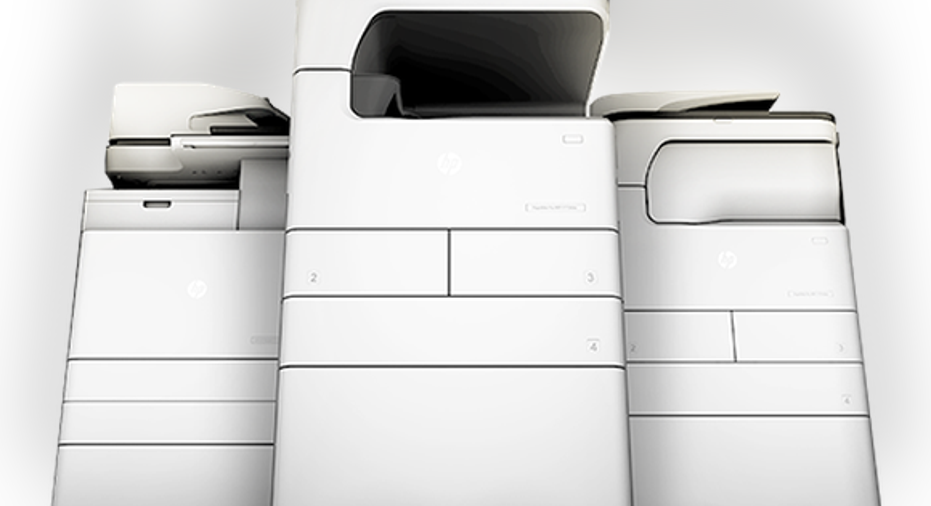HP Inc's Latest Deal Could Be a Game Changer

Despite headlinesto the contrary, the PC market isn't dead -- at least, not in HP's (NYSE: HPQ) case. HP reported a surprisingly strong fiscal 2016 third quarterresults last month thanks to PC sales, though based on investors' so-so reaction and the Street's muted outlook, it may not seem like it.
The problem is twofold: First, the "PC is dead" mantra is tough for HP and other manufacturers to shake. Second, HP's printer division is dragging its quarterly results down, even accounting for its surprisingly strong personal systems revenue last quarter. But CEO Dion Weisler has a plan to change HP's printing fortunes, and he just took a major step in the right direction.
Image source: HP.
What's the problem?
Last quarter's $11.9 billion in total sales was a 4% drop compared to the year-ago quarter, though after accounting for currency, HP's revenue declined a mere 1%. HP's relatively strong performance was thanks in large part to an 8% improvement in consumer PC net revenue, which more than compensated for its slight 3% decline in commercial sales.
HP also reported a 4% increase in total units sold in the quarter, led by a 12% jump in notebook sales. Weisler's objective of targeting specific markets within the PC sector -- the recent unveiling of HP's virtual reality (VR)-ready OMEN devices for the world's gamers is an ideal example -- is taking hold.
HP's stringent cost control initiatives are also making an impact, as evidenced by HP's operating margin's climbing two full percentage points year over year on a non-GAAP (excluding one-time items) basis to 9.4%. Shaving over $3 billion in costs the first three quarters of fiscal 2016, as HP has done, can't help but boost margins. So what's the problem? It's not just the printing division in general; HP's supply sales have tanked. That brings us to its recent,potentially game-changing move.
Image source: HP.
Light at the end of the tunnel
In an effort to "disrupt and reinvent the $55 billion copier industry," HP has inked a deal with Samsungto acquire its printing-copier division for $1.05 billion, making it the largest printing-related deal in HP's history. Similar to HP's strategic efforts to target niche markets for its PC sales, once Samsung's printing unit is in the fold, it intends to redefine a segment "that hasn't innovated in decades."
Anyone who has fought a battle with the office copy machine knows how frustrating the finicky devices can be. HP plans to replace those outdated copiers utilizing contemporary "multifunction printing (MFP) technology."Put simply, HP will use Samsung's existing line-up of MFPs, combined with its PageWide features that enhance efficiency and save costs, to create "the industry's best device, document, and data security" portfolio.
HP expects the Samsung deal will be accretive in year one, instantly giving its printing unit a boost. And Weisler has a couple more cards up his sleeve.
Phases two and three
HP is already a leader in the budding commercial and desktop 3D printing market.According to one conservative estimate, 3D printing will become a $30 billion market by 2022. If HP is able to maintain -- or even grow -- its 3D printing leadership position, it will dovetail nicely with Weisler's other objective: boosting supply sales.
Of HP's $4.4 billion in printing revenue last quarter, $2.84 billion came from supplies. That was an 18% drop compared to a year ago. What to do? Concentrate on developing and selling high-end enterprise printers -- 3D and the soon-to-be-developed MFPs, for example -- to drive supply revenue. Printers sitting next to a consumer's desktop PC at home won't turn the supply revenue tide. But enterprisewide printer-copier MFPs and 3D units can.
HP won't get its printing division turned around overnight, even after assimilating Samsung's line-up. But that shouldn't scare investors -- nor should the fact that HP stock is bumping up against its 52-week high. With HP's 3.3% dividend yield and trading at just 9 times future earnings, patient investors will be rewarded.
A secret billion-dollar stock opportunity The world's biggest tech company forgot to show you something, but a few Wall Street analysts and the Fool didn't miss a beat: There's a small company that's powering their brand-new gadgets and the coming revolution in technology. And we think its stock price has nearly unlimited room to run for early in-the-know investors! To be one of them, just click here.
Tim Brugger has no position in any stocks mentioned. The Motley Fool has no position in any of the stocks mentioned. Try any of our Foolish newsletter services free for 30 days. We Fools may not all hold the same opinions, but we all believe that considering a diverse range of insights makes us better investors. The Motley Fool has a disclosure policy.



















